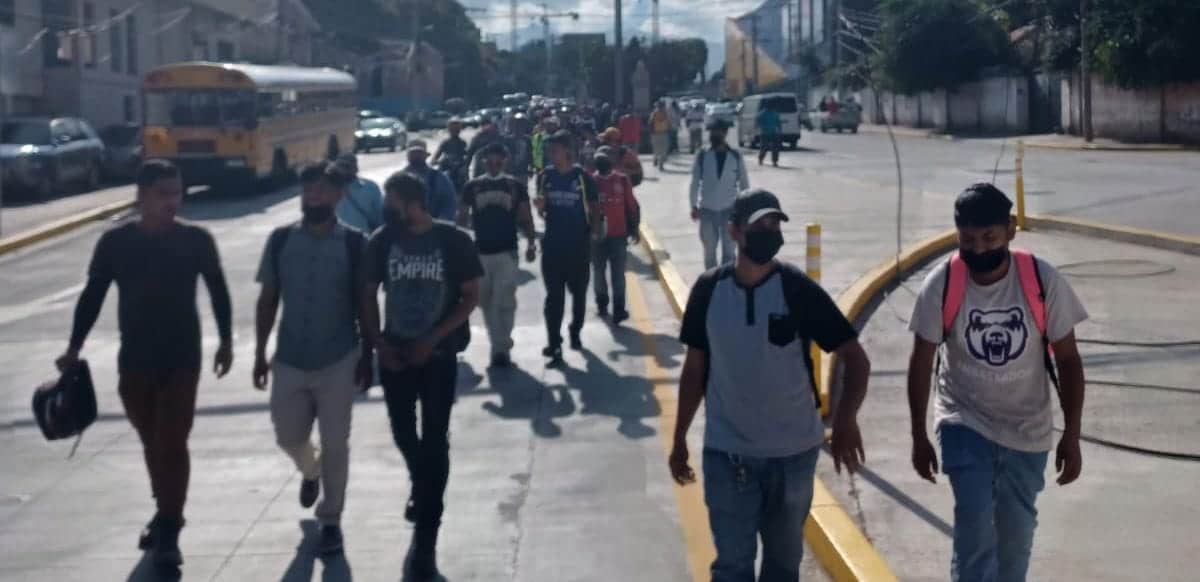
Construction workers in Honduras marched to the existing U.S. embassy from the site of the new embassy, where they've been on strike since early July. Photo from @AdriennePine> on Twitter.

Orinoco Tribune – News and opinion pieces about Venezuela and beyond
From Venezuela and made by Venezuelan Chavistas

Construction workers in Honduras marched to the existing U.S. embassy from the site of the new embassy, where they've been on strike since early July. Photo from @AdriennePine> on Twitter.
By Judy Ancel — Sep 12, 2022
The Biden administration has pledged that “the United States will work with governments to strengthen… the enforcement of labor laws, promote decent work, and support workers in exercising their freedom of association and collective bargaining rights,” as one of four pillars of its strategy to address the root causes of migration from Central America.
In Honduras today the US has an opportunity to practice this with the 1,100 workers it has hired to build a new embassy. But it’s blowing it.
Instead, police have been called in to bust a strike that’s been going on at the construction site in Tegucigalpa since early July.
Of course, the State Department and US Ambassador Laura Dogu all deny that there’s a problem with the treatment of the workers, and they’re pressuring the Honduran government to criminalize the strikers rather than enforce Honduran labor laws.
RELATED CONTENT: Challenging the AFL-CIO’s Labor Imperialism
Loads of federal construction occur outside the US, away from the Davis-Bacon Prevailing Wage Act, the National Labor Relations Act, and the Occupational Safety and Health Act.
This construction is contracted by the State Department’s Bureau of Overseas Building Operations (OBO), whose webpage sports an impressive portfolio of American forts—disguised as ultra-modern architectural wonders—being built in just about every nook and cranny of the world.
Honduras’s newly fortified and expanded embassy is no exception. Construction began in March 2019 and is due for completion in mid-2023.
Last May, Ambassador Dogu remarked at a reception commemorating the completion of the first phase of construction, “What is most important is that we invested in the Honduran people. The construction company B.L. Harbert used strong and talented Honduran labor to achieve this milestone in a short period of time. Currently around 1,000 Hondurans come to work and develop valuable skills.”
“Not true,” say the Honduran construction workers who are so fed up that they’ve seen no alternative but to strike.
They say that B.L. Harbert Construction, an Alabama-based favorite of the State Department for many overseas projects, has repeatedly broken Honduran labor law by pushing illegal temporary contracts on the workers and failing to provide medical care or compensation to injured workers or to discipline racist supervisors.
The strikers display photos of workers with severed fingers in a report and on an ally’s Twitter. In order to avoid a documented injury which would entitle a worker to sue for compensation, workers said supervisors have bypassed the public hospital and taken some injured workers to a private clinic which does not report the injury; as a result, workers can’t access their medical files. Other injured workers are simply fired with no medical care.
In July, a labor law enacted during the regime of Juan Orlando Hernández (JOH) that permitted unregulated temporary contracts was repealed. (Hernández was president of Honduras from 2014 to January 2022, and is now being held in a US prison on charges of partnering with some of the largest cocaine traffickers in the world, who helped finance his political campaigns.) The former labor law which protects workers from firing without just cause was reinstated.
Strikers say the contracts B.L. Harbert unilaterally imposed contained an illegal probationary period, despite the fact that most workers had been working for the company for over ten months. This on top of other grievances precipitated the strike.
In August, when Harbert again tried to impose new contracts, 19 longtime workers were not given contracts, including the strike leaders. They say they were fired in retaliation for their organizing.
Harbert now adds Honduras to a trail of labor disputes in Turkey, Namibia, and Ghana.
The workers, who do not have a union (most of the Honduran construction industry is unorganized) and are inexperienced in labor struggles have had some support from individuals in Honduran unions. They also reached out to the Honduras Solidarity Network in North America for help. We began a campaign to ask members of Congress to investigate the conflict.
I reached out to the OBO’s director of external affairs and media to get a story for my labor radio show. I asked her if the US government applies the same standards it has for federal construction under our labor laws at home to its building abroad, and if not, what standards do they use?